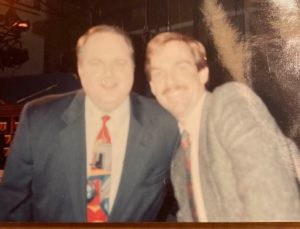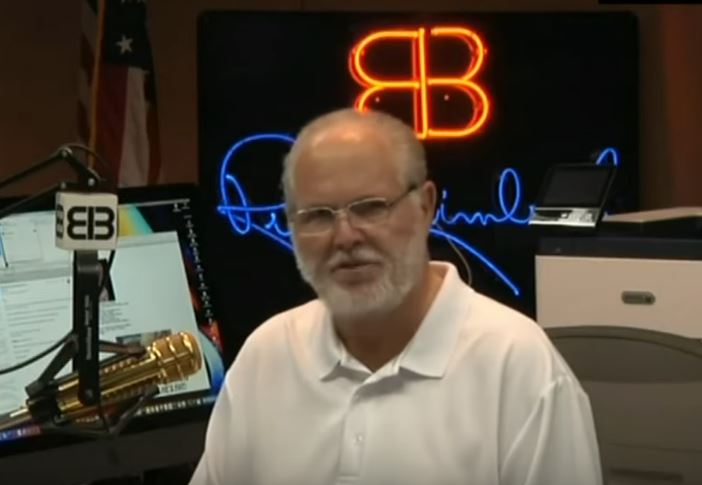Rush Hudson Limbaugh, III died of lung cancer on Wednesday morning, February 17th at the age of 70. He was born to be on radio, which he began at age 16, and did not cease (but for one interlude) until the eve of his death. His final broadcast occurred February 2nd.
Rush was arguably the most influential broadcaster in the century-long history of radio. Perhaps only the late, great Paul Harvey, whose national radio career lasted nearly 60 years, could rival him, though Harvey’s daily segments were much shorter.
Rush took sides on policy and cultural issues, which made him controversial, but especially impactful. He was a proud conservative on the political spectrum, which made him a rarity in the larger, opinionated entertainment industry that he was part, including the news media.
On environment and climate issues, Rush had particular influence and  importance, without which there may not have been much of a debate on those subjects today, including the socialistic Green New Deal, the feckless Paris Accord, and much else.
importance, without which there may not have been much of a debate on those subjects today, including the socialistic Green New Deal, the feckless Paris Accord, and much else.
Rush Limbaugh’s national broadcasting career lasted exactly 32½ years. Soon after he went nationwide on August 1, 1988, he was the number one radio personality for the next three decades. He was highly skilled at the craft, informative and insightful. Many successful A-list actors have long careers, but none remain on top for such a sustained period.
Rush was successful because he mastered the formula for broadcast prosperity: he blended substance and humor. When you listened on almost any given day, you learned and laughed. You learned about a policy issue or current event, and you laughed at one of his parodies, voice imitations, issue “updates,” or song makeovers. He sought both to entertain and to teach his audience. He understood that life should not have too much of one without the other.
Rush Limbaugh got the attention of every president, for better or worse. In 1994, President Bill Clinton got so frustrated with him that he called into another radio show from Air Force One to vent how unfair it was that Rush had three hours of air time daily, notwithstanding that a president has the largest bully pulpit on the planet.
Rush was a political force because of his large daily audience, which numbered in the twenty millions each week. No other media outlet could rival his reach, and he dwarfed the impact of any issue magazine, website or think tank of the last four decades. His influence was such that he was made an “honorary” member of the large congressional Republican freshmen class of 1994, as they credited him for helping the Party win the U.S. House majority for the first time in 42 years.
Significantly, Rush’s reach and influence remained as communication and entertainment exploded in the 1990’s and after with expanded television, the Internet, and radio talk shows. He always stood out, which fellow radio broadcasters whom he spawned readily acknowledged.
Rush properly understood “climate change” issues as political, not scientific, and he ridiculed the notion of an “existential threat” to the planet. He called climate change a “hoax” that was advanced by liberals as a means to expand government and wield greater power and control over the populace – and thus, antithetical to liberty. He understood that climate change shibboleths were being used to decide what car you must drive, what food you must eat, what energy you must pay for, and more broadly, whether we remain a free and prosperous country.
Understanding the insidious implications and objectives of climate change politics, as Rush did, was not a denial that climate changes. You can criticize the climate change cottage industry and its claims, and embrace conservation and clean air and water. They are perfectly consistent.
The Green extremists also did not escape Rush’s mockery and humor. His “environmental update” theme used chainsaws cutting down forests as background noise to introduce a story about what he called “environmentalist wackos.”
Rush Limbaugh had a connection to CFACT, which was one of his go-to places for environment and energy issues; in particular, Climate Depot, which he viewed as his favorite source of climate change information other than himself. (That was another part of his humor, his braggart act, which was always meant as lighthearted.)
In the early 1990s, Marc Morano, before he became CFACT’s Director of Communications, was Rush Limbaugh’s “Man in Washington,” as he described. Admittedly, Rush also once said he never liked the word “Committee” as part of CFACT’s name
Countless tributes to Rush Limbaugh’s character, impact and memory have poured in since the news of his passing. There also are plenty of haters weighing in and impervious to, or unembarrassed about, their predictable invective, which underscores his effectiveness and influence.
Rush Limbaugh’s battle with lung cancer for the last twelve months was a model of courage and class. He never pitied himself, and remained engaging on his show and ever grateful for his audience.
Lunch at my work desk will not quite be the same.
Our condolences from the CFACT team go out to Rush Limbaugh’s wife, Kathryn, his brother, David, and his extended family.
Rush was a pioneer of his genre and a living legend. Now may he rest in peace.
